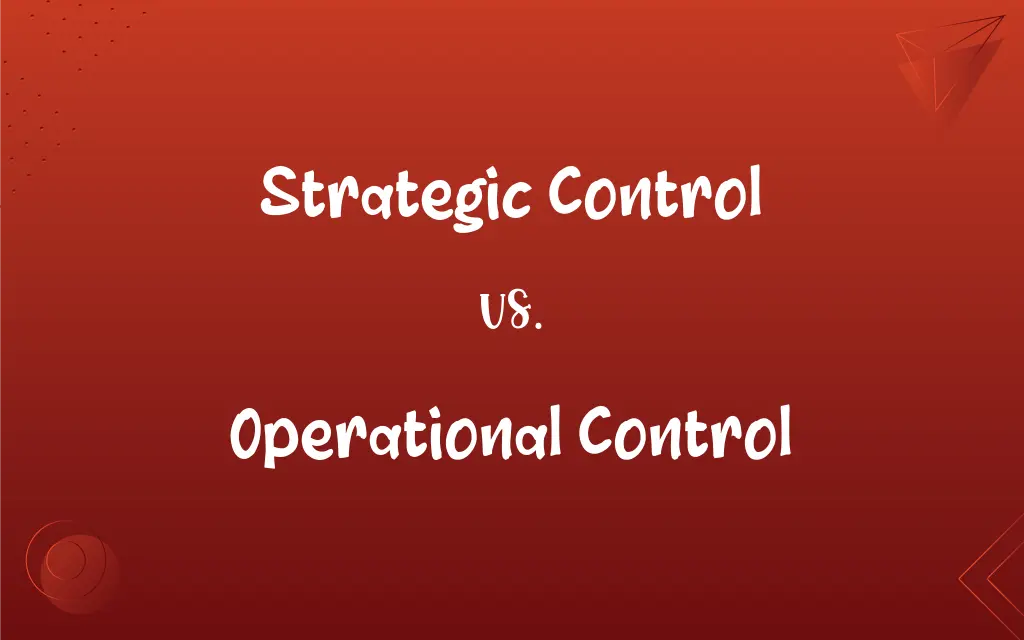Strategic Control vs. Operational Control: What's the Difference?
Edited by Janet White || By Harlon Moss || Published on November 20, 2023
Strategic control focuses on ensuring long-term goals are on track, while operational control manages daily tasks and functions to achieve those goals.

Key Differences
Strategic control and operational control are both vital management tools but serve different purposes. Strategic control is about assessing and adjusting a company's long-term direction and strategies. It ensures that the organization is moving in the intended direction and achieving its larger objectives. In contrast, operational control is about overseeing the day-to-day operations of an organization to ensure they align with strategic goals.
In essence, strategic control is macro-level, examining the broader scope of the company, ensuring the chosen strategies are effective and responsive to external changes. Operational control, on the other hand, is micro-level, focusing on tasks, processes, and activities, ensuring efficiency and quality in daily operations.
Both controls are crucial for organizational success. Without strategic control, a company might drift away from its main objectives, wasting resources and losing its competitive edge. Without operational control, daily operations might become inefficient, leading to waste, errors, and missed opportunities, all of which can hinder the execution of strategic plans.
The tools and metrics used for each control differ significantly. Strategic control might involve tools like SWOT analysis, competitive benchmarking, or strategy reviews. Operational control, however, would lean more towards performance metrics, quality checks, and process evaluations.
Ultimately, while strategic control gives a business its direction and purpose, operational control ensures that every step taken is in alignment with that direction, guaranteeing smooth execution of the larger plan.
ADVERTISEMENT
Comparison Chart
Focus
Long-term direction and strategies.
Daily tasks and functions.
Level
Macro-level (broader scope).
Micro-level (detailed operations).
Purpose
Ensure strategies align with objectives.
Ensure daily operations align with strategic goals.
Tools/Metrics
SWOT analysis, competitive benchmarking, strategy reviews.
Performance metrics, quality checks, process evaluations.
Response to Changes
Adapts to external environmental shifts.
Adjusts to internal operational inefficiencies.
ADVERTISEMENT
Strategic Control and Operational Control Definitions
Strategic Control
Adjusting strategies based on external changes.
With the rise of digital platforms, strategic control led to a shift in advertising efforts.
Operational Control
Managing day-to-day organizational tasks.
The manager's operational control kept the factory running smoothly every day.
Strategic Control
Monitoring the effectiveness of business strategies.
Through strategic control, the firm realized its market approach needed revision.
Operational Control
Implementing checks on quality and processes.
Operational control mandated regular equipment checks to prevent breakdowns.
Strategic Control
Oversight of long-term organizational goals.
The CEO used strategic control to adjust the company's five-year plan.
Operational Control
Overseeing daily functions to align with strategic objectives.
Through operational control, the sales team met their monthly targets consistently.
Strategic Control
Ensuring alignment between strategy and objectives.
Strategic control ensured the new acquisition was in line with growth objectives.
Operational Control
Ensuring efficiency in daily business operations.
Operational control identified bottlenecks in the production line, leading to faster output.
Strategic Control
Reviewing and reassessing high-level business direction.
Annual strategy retreats are a form of strategic control to revisit company goals.
Operational Control
Guiding operational decisions based on performance metrics.
Operational control used data analytics to optimize inventory levels.
FAQs
Can an organization focus on one control and ignore the other?
Both are crucial for success; focusing on one at the expense of the other can lead to inefficiencies or drift from goals.
How do these controls complement each other?
While strategic control sets the direction, operational control ensures day-to-day operations align with that direction.
Are performance metrics a part of operational control?
Yes, performance metrics are vital tools in operational control.
What does operational control entail?
Operational control manages and oversees daily organizational tasks and functions.
If a machine breaks down frequently, which control addresses it?
Operational control addresses such day-to-day operational issues.
How do companies adjust when strategic control identifies misalignment?
They might revise their strategies, set new objectives, or reallocate resources.
Do the tools used in strategic control differ from operational control?
Yes, strategic control uses broader analytical tools, while operational focuses on detailed performance metrics.
Is strategic control about day-to-day operations?
No, it's about the long-term direction and effectiveness of strategies.
How often is strategic control typically done?
It's often done periodically, like annually or quarterly, but can vary based on the organization and environment.
Can operational control affect strategic decisions?
Yes, insights from daily operations can influence strategic decisions and adjustments.
What is a key objective of operational control?
Ensuring efficiency, quality, and alignment in daily operations.
Are both controls static, or do they evolve?
Both are dynamic and evolve based on internal and external factors.
What is strategic control?
Strategic control involves monitoring and adjusting an organization's long-term direction and strategies.
What could happen without operational control?
There could be inefficiencies, errors, and misalignment with strategic goals in daily operations.
Which control helps in facing competitive challenges?
Strategic control helps in assessing and adjusting to competitive challenges.
Are middle managers involved in operational control?
Yes, middle managers often oversee daily operations and implement operational control.
How can external environmental changes affect strategic control?
External changes can lead to a need for strategy adjustments, which is overseen by strategic control.
Can operational control help in cost-cutting?
Yes, by identifying inefficiencies and optimizing processes.
Who is typically responsible for strategic control in a large company?
Top management or executives often handle strategic control.
How does strategic control respond to industry trends?
It evaluates trends' impacts on the organization's direction and may adjust strategies accordingly.
About Author
Written by
Harlon MossHarlon is a seasoned quality moderator and accomplished content writer for Difference Wiki. An alumnus of the prestigious University of California, he earned his degree in Computer Science. Leveraging his academic background, Harlon brings a meticulous and informed perspective to his work, ensuring content accuracy and excellence.
Edited by
Janet WhiteJanet White has been an esteemed writer and blogger for Difference Wiki. Holding a Master's degree in Science and Medical Journalism from the prestigious Boston University, she has consistently demonstrated her expertise and passion for her field. When she's not immersed in her work, Janet relishes her time exercising, delving into a good book, and cherishing moments with friends and family.






































































